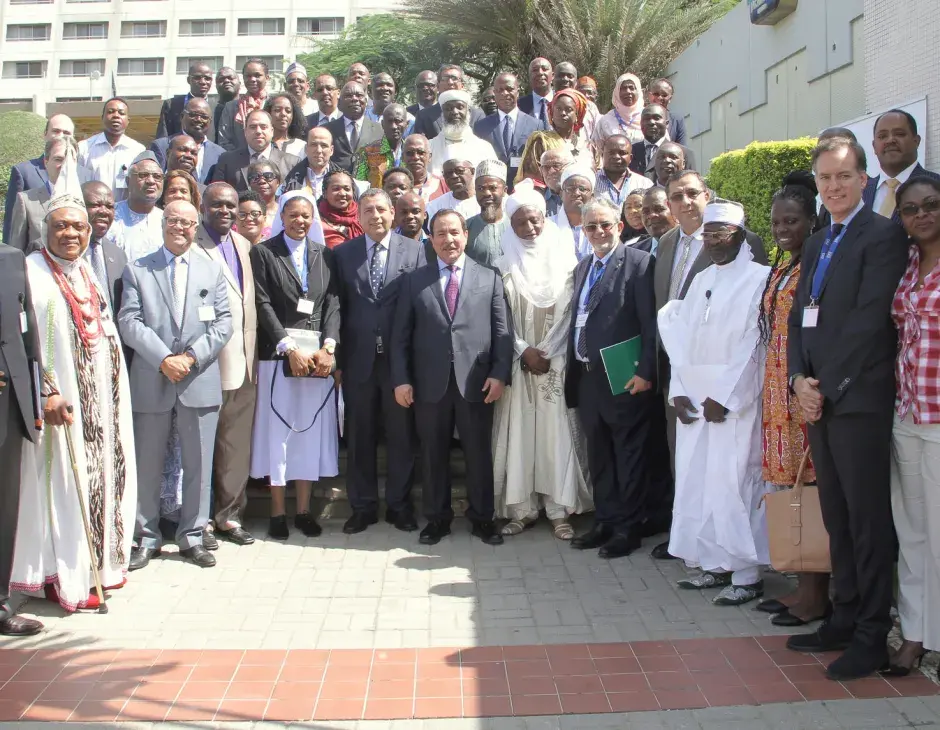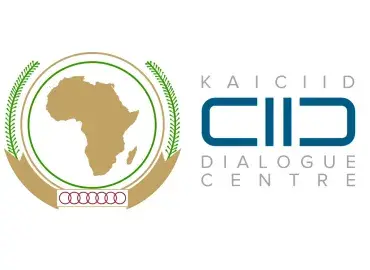Interfaith Dialogue Forum Commits to Peace through Education, Partnerships, Media and Development Agenda
November 11, 2016, Abuja, Nigeria – Religious leaders, policy makers, scholars and representatives of civil society organisations from more than thirty (30) African countries gathered at the 2nd Interfaith Dialogue Forum, held from 10 to 11 November 2016 in Abuja, Nigeria. The Forum recognised the importance of interreligious and intra-faith dialogue as a tool for peacebuilding and development in Africa. Following an intensive two-day deliberation, the delegates approved a Declaration and a Plan of Action on their joint work in education, partnerships, media and development. The Forum was jointly organised by the African Union Commission through the Citizens and Diaspora Directorate (CIDO) and the International Dialogue Centre (KAICIID).
The Declaration acknowledges the need to build partnerships between the African Union, interfaith, faith-based groups, organisations and religious leaders and reiterates their commitment to play an effective role in the successful implementation of the African Aspirations outlined in the Continental Agenda 2063 framework.
As part of the Action Plan, the African Union will support the Steering Committee to establish a 10 year interfaith development agenda for all African Union member states.
The Forum succeeded in electing a Steering Committee of two years’ term to support and strengthen the process of interreligious and intercultural dialogue within African countries and communities.
“This platform is an example of a functional alliance between political and religious leaders in service of the African continent who seek to direct efforts towards practical action by preserving the values of respect, plurality, diversity, religious tolerance and peaceful coexistence. And this forum is an essential part of the peaceful and timely resolution of conflict in Africa attained with dialogue and not the use of guns,” said the representative of the African Union Commission, Amb Jalel Chelba, from CIDO.
“Religious leaders need to be heard by policymakers and to engage constructively with them to share joint concerns and learn from each other. They need to be able to collaborate, not only with each other, but with all sectors of society. The steering committee launched today is a vital instrument in that endeavour. It fosters among other relations, interreligious dialogue, which is an integral component in achieving the Africa Agenda 2063, global strategy to optimize use of Africa’s resources for the benefit for all Africans,” said KAICIID Secretary General Faisal bin Muaammar.
Among the recommendations in education, the Action Plan calls for promoting a culture of peace and reconciliation through the teachings of the different holy books in all places of worship and to enhance media coverage, the Action Plan recommends training for journalists covering religious issues. A platform that encourages the “soft power of religion” is to be launched to prevent violent extremism, the instrumentalisation of religion and religiously motivated violence is also considered.
For more information please contact:
Ms Eimen Kheir: Policy Officer, CIDO: [email protected],
Mr. Ernest Kaliza and Ms. Sarah Abdel-Mohsen Communication Officers-CIDO: [email protected];
Mariela Hoyer Starcevic, Public Affairs Officer, KAICIID: [email protected]
[email protected], [email protected]
Photos can be found on AU's Flickr account here.
About CIDO
The Citizens and Diaspora Directorate (CIDO) is a directorate under the Bureau of the Chairperson of the African Union commission. It is designed to serve as a catalyst to facilitate the involvement of African peoples in the continent and the Diaspora in the affairs of the African Union. Its commitment is to ensure that the AU represents not only African governments, but also the people of Africa. Its overall mission is to engage all elements of African communities, namely civil society and the African diaspora, in the development and support of AU activities, decision-making processes, policy programmes, institutions, organs and overall goals.
November 1, 2016, Abuja, Nigeria − In an effort to promote interreligious dialogue as a means to…


